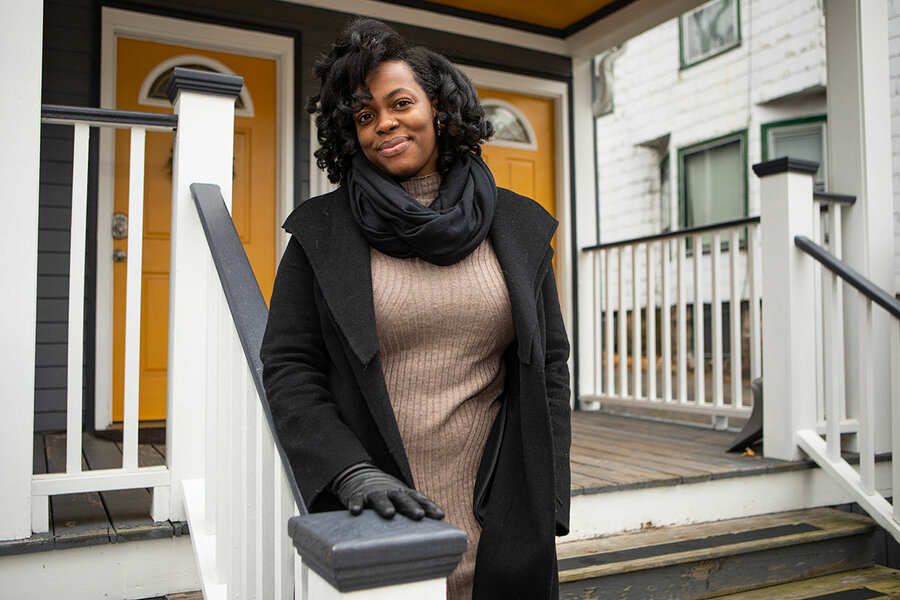Christmas without commerce: Celebrating without shopping
Loading...
For most people participating in Christmas or Hanukkah, presents are part and parcel of the season. Whole economies bank on the flurry of purchases that begin in earnest on Black Friday. Yet there are those who, for various reasons, eschew buying stuff for others. Not because they’ve adopted a “Bah! Humbug!” attitude. Rather, they find greater value in offering nontraditional gifts such as handmade presents, acts of kindness, or just spending time with friends and family. They’re forms of generosity that aren’t rooted in materialism.
In Boston, Jane Taylor’s impulse at Christmas is to give her time to those who need it most. When she isn’t volunteering at a nonprofit that helps feed low-income families, she’s baking for friends and family. When she does buy gifts, they’re handcrafted items that benefit a charity. For this Quaker, Christmas is a time to think about all humankind.
Why We Wrote This
A story focused onLike the Grinch, these revelers have realized Christmas doesn’t come from a store. How they make the day mean just that little bit more.
Inspired by the story of the donkey that gave up its manger to Jesus, Ms. Taylor also opens her home to strangers.
“I have rooms in my house that are filled with people, and they are all coming from different countries and different needs,” she says. “That’s the whole Christmas story to me. It’s about giving.”
Jaiy Dickson’s family has an unorthodox Christmas tradition: no gift giving.
For years, the Boston-based law student would pool resources with her sister and stepfather to buy her mother appliances such as a KitchenAid mixer. In turn, Ms. Dickson’s mother would buy her adult daughters a select item, such as a winter coat. But the family members began running out of ideas for bigger gifts. So, a few years ago, they collectively decided to stop giving presents altogether. As a result, her family’s outlook on what makes the Yuletide season meaningful has shifted.
“We get to spend time together and enjoy each other’s company. We’re thankful for each other,” says Ms. Dickson during a Zoom call. “My friend actually calls it ‘celebrating capitalism’ rather than ‘celebrating Christmas.’ And I’m like, ‘Yeah, I’m not celebrating capitalism this year.’”
Why We Wrote This
A story focused onLike the Grinch, these revelers have realized Christmas doesn’t come from a store. How they make the day mean just that little bit more.
For most people participating in Christmas or Hanukkah, presents are part and parcel of the season. Whole economies bank on the flurry of purchases that begin in earnest on Black Friday. Yet there are those who, for various reasons, eschew buying stuff for others. Not because they’ve adopted a “Bah! Humbug!” attitude. Rather, they find greater value in offering nontraditional gifts such as handmade presents, acts of kindness, or just spending time with friends and family. They’re forms of generosity that aren’t rooted in materialism.
“Thank you all”
The no-gift philosophy can be hard to explain to others, says Jimmy Sapiega, a social worker in McHenry, Illinois. His young nieces’ Christmas wish lists include tablets and phones. But although Mr. Sapiega treats his sister’s family to meal outings, he tells his nieces that cooking together or playing card games is more precious than anything money can buy.
“I grew up a very spoiled child,” says Mr. Sapiega, who explains he was given several hundred dollars worth of presents each year. During his teens, Mr. Sapiega revolted against the messy clutter he’d accumulated. He now lives simply and inexpensively.
“My father passed away about 12 years ago, and the last words he said to us were ‘Thank you all for being my family.’ That’s really stuck with me ever since,” says Mr. Sapiega in a Zoom call. “You’ll never see a U-Haul behind a hearse.”
Renee Bergeron, author of a blog about how to lead an austere lifestyle, established non-gift Christmas traditions for her family. She and her husband have 14 children, five of whom are adopted. (“I’m a minimalist in every area – except for kids,” says Ms. Bergeron, laughing over the phone.) Their family-focused holidays include going to church, donating food to homeless people, decorating cookies, and watching a Christmas movie.
“We are Christians, so we wanted to keep the focus on Jesus,” she explains. “So we said, ‘Let’s start some traditions purposefully that aren’t wrapped up in giving actual gifts.’”
They do make one small concession. Each family member gets a Christmas stocking containing an orange, a candy cane, and one nominal, thoughtfully chosen item. The idea was inspired by a “Little House on the Prairie” novel in which Laura Ingalls Wilder is delighted to reach into her stocking and find a tin cup, sticks of peppermint, a cake, and a shiny penny.
“[Laura’s father] says something like, ‘It’s almost too much,’” says Ms. Bergeron, who lives in Bellingham, Washington. “As we read and loved those [books], we thought, ‘We don’t want every year at Christmas to be bigger and better.’”
Many parents are wary of trying to top the previous year’s gifts, especially at a time of high inflation. Ipsos, a market research firm, conducted a poll on behalf of Shutterfly and found that close to 2 in 3 Americans say they’re concerned about the impact of recent price increases on their holiday budget.
“At the same time, when you ask people what’s important when they’re thinking about gift giving, the number one thing is finding a thoughtful gift that someone would love,” says Mallory Newall, an Ipsos vice president. “So even with economic concerns ever present in our minds right now, Americans are still looking for ways to bring joy and warmth to the holiday season.”
Inflation is inspiring many Americans to fulfill Christmas wish lists with items that other people are giving away, says Liesl Clark, CEO of the Buy Nothing Project, which she helped found in 2013. Ms. Clark says that the movement now has more than 7 million people participating in neighborhood-based recycling groups, connected by an app and social media.
“Once I do receive a mountain bike from a neighbor that I can give to my daughter for the holidays, I would then be able to go into the app and click on ‘Gratitude,’ and then post my thanks to that neighbor,” says Ms. Clark in a phone call from Bainbridge Island, Washington. “Everyone gets to look on at and witness this expression of gratitude. Everyone feels the joy from that expression.”
Another option: Make your own gifts. Michele Guieu, the arts director for the Millennium Alliance for Humanity and the Biosphere environmental group, recently wrote an article sharing her ideas for creating eco-friendly presents. The San Francisco Bay Area artist makes tree ornaments out of paper bags and found pieces of wood. Last Christmas, Ms. Guieu’s adult son made a drawing of her and her husband.
“It goes back to the importance of things compared to the importance of people, moments, experience,” says Ms. Guieu.
“More time to spend together”
For Susan Kay, from Cooper’s Landing, Missouri, the most valuable gift is one’s time. “I would always say, ‘No presents, but your presence is required,’” says Ms. Kay over Zoom.
Her parents taught her the value of “round to it” gifts, namely helping others do things they haven’t gotten around to, like winterizing a yard, repairing a step, or fixing a leaky toilet.
“It also gave us the time to visit – not just then during what we were doing – but then also because we had saved time by doubling up,” says Ms. Kay. “And so we’d have more time to spend together.”
In the Boston neighborhood of Dorchester, Jane Taylor’s impulse at Christmas is also to give her time to those who need it most. When she isn’t volunteering for Fair Foods, a nonprofit that helps feed low-income families, she’s baking Christmas cookies, bread, and gingerbread men for friends and family. When she does buy gifts online, they’re handcrafted items that benefit a charity. At Quaker meetings, Ms. Taylor sings carols that get her thinking about all humankind.
“We’re celebrating every life, every baby, every child, regardless of race, religion, any of those things,” says Ms. Taylor during a Zoom call.
Inspired by the Christmas story of the donkey that gave up its manger to Jesus, Ms. Taylor also opens her home to strangers.
“I have rooms in my house that are filled with people, and they are all coming from different countries and different needs,” she says. “That’s the whole Christmas story to me. It’s about giving.”
Editor’s note: This story has been updated to correct the amount of gifts Mr. Sapiega said he received as a child. It was several hundred dollars worth, as Mr. Sapiega shared with the Monitor after publication.









